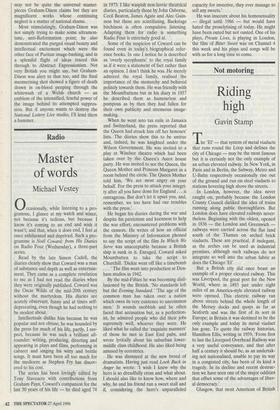Radio
Master of words
Michael Vestey
occasionally, while listening to a pro- gramme, I glance at my watch and wince, not because it's tedious, but because I know it's coming to an end and wish it wasn't; and that, when it does end, I feel at once exhilarated and deprived. Such a pro- gramme is Noel Coward: from His Diaries on Radio Four (Wednesday), a three-part series.
Read by the late Simon Cadell, the diaries clearly show that Coward was a man of substance and depth as well as entertain- ment. They came as a complete revelation to me as I had not read the diaries when they were originally published. Coward was the Oscar Wilde of the mid-20th century without the martyrdom. His diaries are acutely observant, funny and at times self- deprecating, even though he had nothing to be modest about.
Intellectuals dislike him because he was popular and not obtuse; he was hounded by the press for much of his life, partly, I sus- pect, because he was such a brilliant all- rounder: writing, producing, directing and appearing in plays and films, performing in cabaret and singing his witty and brittle songs. It must have been all too much for the mediocre as Stephen Fry has discov- ered to his cost.
The series has been lovingly edited by Tony Staveacre with contributions from Graham Payn, Coward's companion for the last 30 years of his life — he died aged 74 in 1973. I like waspish non-luwie theatrical diaries, particularly those by John Osborne, Cecil Beaton, James Agate and Alec Guin- ness but these are scintillating. Backstage bitchiness is often compulsive listening. Adapting them for radio is something Radio Four is extremely good at.
Some of the suspicion of Coward can be found even in today's biographical refer- ence books. In one I notice he is described as 'overly sycophantic' to the royal family as if it were a statement of fact rather than an opinion. I don't think he was. He merely admired the royal family, realised the importance of the monarchy and behaved politely towards them. He was friendly with the Mountbattens but in his diary in 1957 he described them as humourless and pompous as by then they had fallen for their own publicity and strenuous image- making.
When he went into tax exile in Jamaica and Switzerland, the press reported that the Queen had struck him off her honours' lists. The diaries show this to be untrue and, indeed, he was knighted under the Wilson Government. He was invited to a play at Windsor theatre which had been taken over by the Queen's Ascot house party. He was invited to see the Queen, the Queen Mother and Princess Margaret in a room behind the circle. The Queen Mother told him, 'We are most angry on your behalf. For the press to attack your integri- ty after all you have done for England .. . is outrageous. But don't let it upset you, and, remember, we too have had our troubles with the press.'
He began his diaries during the war and despite his patriotism and keenness to help the war effort, encountered problems with the censors. He writes of how an official from the Ministry of Information phoned to say the script of the film In Which We Serve was unacceptable because a British ship is sunk in it. Enraged, Coward asked Mountbatten to take the script to Churchill. `Dickie went off like a timebomb . . . ' The film went into production at Den- ham studios in 1942.
By the mid-Fifties he was becoming disil- lusioned by the British. 'No standards left but the Evening Standard. "The age of the common man has taken over a nation which owes its very existence to uncommon men.' It sounds snobbish and he often faced that accusation but, as a perfection- ist, he admired people who did their jobs supremely well, whoever they were. He liked what he called the 'exquisite manners' of those he met in East End pubs, and wrote lyrically about his suburban lower- middle class childhood. He also liked being amused by eccentrics.
He was dismayed at the new breed of dramatists. Having just read Look Back in Anger he wrote: 'I wish I knew why the hero is so dreadfully cross and what about. I should also like to know how, where and why, he and his friend run a sweet stall and if, considering the hero's unparalleled capacity for invective, they ever manage to sell any sweets.'
He was insecure about his homosexuality — illegal until 1966 — but would have hated the proselytising of today. He might have been outed but not ousted. One of his plays, Private Lives, is playing in London, the film of Bitter Sweet was on Channel 4 this week and his plays and songs will be with us for a long time to come.


























































 Previous page
Previous page